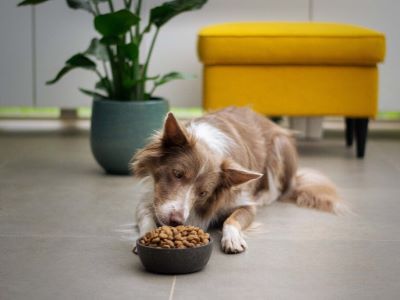Itchy and irritated skin can be miserable for dogs and their owners. The constant scratching and licking causes broken skin, infections, and understandable frustration. But before resorting to medications and ointments, pet owners should explore using diet as a natural solution. Thus, the question arises, “What to Feed Dogs with Itchy Skin?“
In this article, we will explore the best dietary options for resolving the never-stopping itch. Certain anti-inflammatory foods, fatty acids, and supplements can strengthen the skin barrier, reduce inflammation, and avoid trigger ingredients. You will learn which nutritious foods to add and which to avoid when designing a skin-friendly diet.

Cause of Itchy Skin in Dogs
There is a variety of factors that your dog can trigger that make it itch again and again. Allergies are the general cause of itchiness and skin irritation. Food allergies may be provoked by ingredients like beef, dairy, chicken, lamb, fish, eggs, corn, wheat, and soy.
Allergens like dust mites, pollen, mould spores, and grass are everywhere and are called environmental allergens. These allergens can cause skin irritation when dogs are exposed outside the house.
Even parasites such as fleas, mites, lice, or ticks lead to excessive scratching and skin inflammation through direct bites.

Infections by bacteria or yeast on the skin itself can generate significant inflammation, redness, and itchiness. Dogs that are prone to dry and flaky skin experience itchiness and loss of skin elasticity due to lack of fatty acids, genetics, low humidity, or excessive bathing.
Other problems like allergic reactions, endocrine and immune disorders, nervous system issues, and cancer can have itchy skin as a symptom. And the question remains “What to Feed Dogs with Itchy Skin?“
Best Foods for Soothing Irritated Skin

Dietary habits of your dogs have to be changed as per what your veterinarian prescribes you to. Food supplements help them to support their skin and avoid infection in irritated and infected areas. The best foods for your dog to reduce inflammation and itchiness are categorised as follows[1]:
- Omega-3 Fatty Acids – This can be found commonly in fish. Omega-3s help reduce inflammation. Salmon, sardines, and mackerel are great choices of fish that can provide Omega-3s to your pet.
- Probiotics – These are helpful probiotic bacteria that support healthy skin. You can try giving yoghurt, kefir, or probiotic supplements to your dog as probiotics that prevent bacterial infections from keeping their digestive canals clean.
- Oatmeal – It soothes and moisturizes skin your dog’s skin. You can look for oatmeal shampoos and hydrating oatmeal treats to get the best results.
- Fruits and Veggies – Giving them fruits and vegetables to eat will provide them with sufficient antioxidants. You can give them carrots, berries, and spinach to aid skin health.
- Chicken and turkey – Chicken and Turkey contain nutrients for the skin barrier without common allergens which makes them safe to consume.
- Eggs – A highly digestible protein source that rarely triggers allergy.
- Brown Rice – The best whole grain that provides B vitamins for the skin.
Focus on limited-ingredient, grain-free formulas without fillers or artificial additives. Consult your vet on vitamins and supplements too. Read labels carefully and transition diets slowly to find relief.
Ingredients and Supplements for Skin Health

Ingredients and Supplements are important for your pooch. You might feel that your regular dog food covers all harmful allergens and bacterial infections, but it does not. We humans also take multivitamins and supplements to have good skin and hair, and so should our pets.
Certain ingredients and supplements added to a dog’s diet can boost their skin health. Some of them are here as follows:
The Power of Omega Fatty Acids
Fatty acids like Omega-3 and Omega-6 are extremely beneficial for dogs and itchy, inflamed skin. Omega-3s from fish, flaxseed, and evening primrose oils have powerful anti-inflammatory properties to soothe skin irritation. They also support skin hydration and flexibility. Omega-6 fatty acids promote skin regeneration. You have to make sure your dog’s diet provides ample omega fatty acids.
Antioxidants for Skin Protection
Antioxidants like vitamin E and vitamin A protect skin cells from damage caused by things like UV radiation, pollution, and other environmental factors. Food or supplements rich in Vitamin E will help defend skin cell membranes. Foods enriched with Vitamin A like chicken liver, sweet potatoes, carrots and fish oils aid skin cell regeneration and repair. These antioxidants strengthen the skin barrier.
Zinc and biotin specifically support healthy skin growth and maintenance. Zinc promotes wound healing and reduces skin inflammation. Biotin is essential for skin and coat health. Ensure your dog's diet provides plentiful minerals and B complex vitamins.
The Microbiome Matters
The microbiome bacteria living on the skin impact its health. Oral probiotic supplements containing strains like Lactobacillus and Bifidobacterium help balance good and bad bacteria. Which indirectly improves the dog’s skin microbial environment.
Digestion for Nutrient Absorption
Digestive enzymes taken with meals allow dogs to fully break down and absorb skin-supporting nutrients from their food. You should always remember to give easily digestible ingredients.
Home Remedies for Itchy Dogs
Coconut oil and fish oil supplements can help soothe irritated skin and promote a healthy coat. However, always consult your veterinarian before trying any home remedies to ensure your pet is receiving proper nutrition and veterinary care.
Transitioning Your Dog to a Skin-Friendly Diet

Changing diets for your pets can be challenging as a dog owner. Certain diets and restrictions have to be followed for your dog’s better health conditions. The phase can be a little tricky where it has to stop eating its favourite treats and table scraps from the dinner table, but you’re just doing what is necessary. Here are a few tips for switching your dog to a Specialized Diet[2]:
- Mix old and new food – Gradually transition over 7-10 days by mixing a little more new food each day.
- Watch for reactions – Note any changes in appetite, energy, stool, or skin during transition.
- Patience is key – It may take 6-8 weeks on a new diet to see noticeable improvements.
- Supplement carefully – Slowly introduce any new supplements and monitor their effects.
- Avoid extra treats – Stick to approved skin-friendly treats to prevent reactions.
- Read labels – Check all food ingredients carefully for potential irritants.
- Consult your vet – Get specific diet recommendations from your veterinarian for your dog.
With some care and patience, you can successfully shift your dog to a specialized diet to improve their skin health for the long term.
FAQs
What to Feed Dogs with Itchy Skin?
Home-cooked food may be an option, but you must consult a vet to ensure it is nutritionally balanced.
What foods tend to cause itchy skin in dogs?
Common allergens like beef, dairy, chicken, lamb, fish, eggs, soy, wheat, and corn often cause itchy skin reactions in sensitive dogs.
Should I put my dog on a hypoallergenic diet?
Your vet may recommend a hypoallergenic, limited-ingredient diet trial using a novel protein like kangaroo or duck to identify food allergies causing itchy skin.
How long does it take to see results from a diet change?
It can take 6-8 weeks on a new diet to notice significant improvements in itchy skin as food allergens leave your dog’s system.
Should I give my dog omega supplements?
Fish oil or evening primrose oil supplements rich in omega-3 and omega-6 fatty acids can aid itchy skin, but consult your vet on dosage.
Conclusion
This article flashes light on the question “What to feed dogs with itchy skin?“. Itchy skin should never prevent a dog from living their best life. While ointments and medications temporarily relieve symptoms, truly solving the problem requires addressing the root cause through diet.
Work with your veterinarian to identify food allergies or nutrient deficiencies worsening skin issues. Transition your dog to a customized meal plan using limited ingredients and skin-healthy supplements like omega fatty acids, vitamins E and A, zinc, and probiotics.
It can take 6-8 weeks on the new diet to see real improvements as irritants leave their system, so patience and consistency are key. By implementing the right nutritional plan tailored to your dog’s needs, their skin sensitivities don’t have to control their happiness.
References:
- Natural Supplements for Dogs with Itchy Skin | pedMD
- 5 Natural Remedies to Help Your Itchy Dog | AKC Pet Insurance



